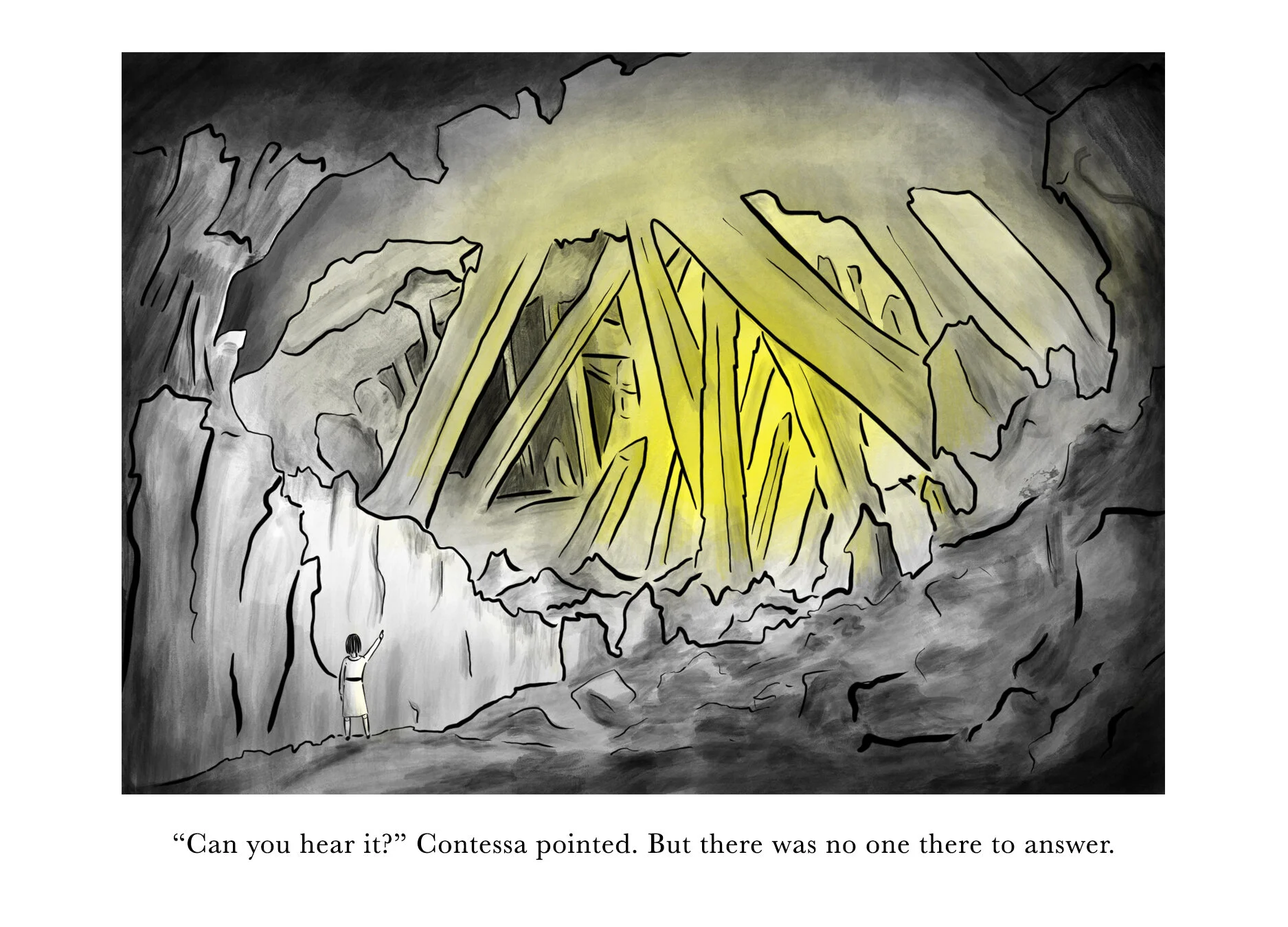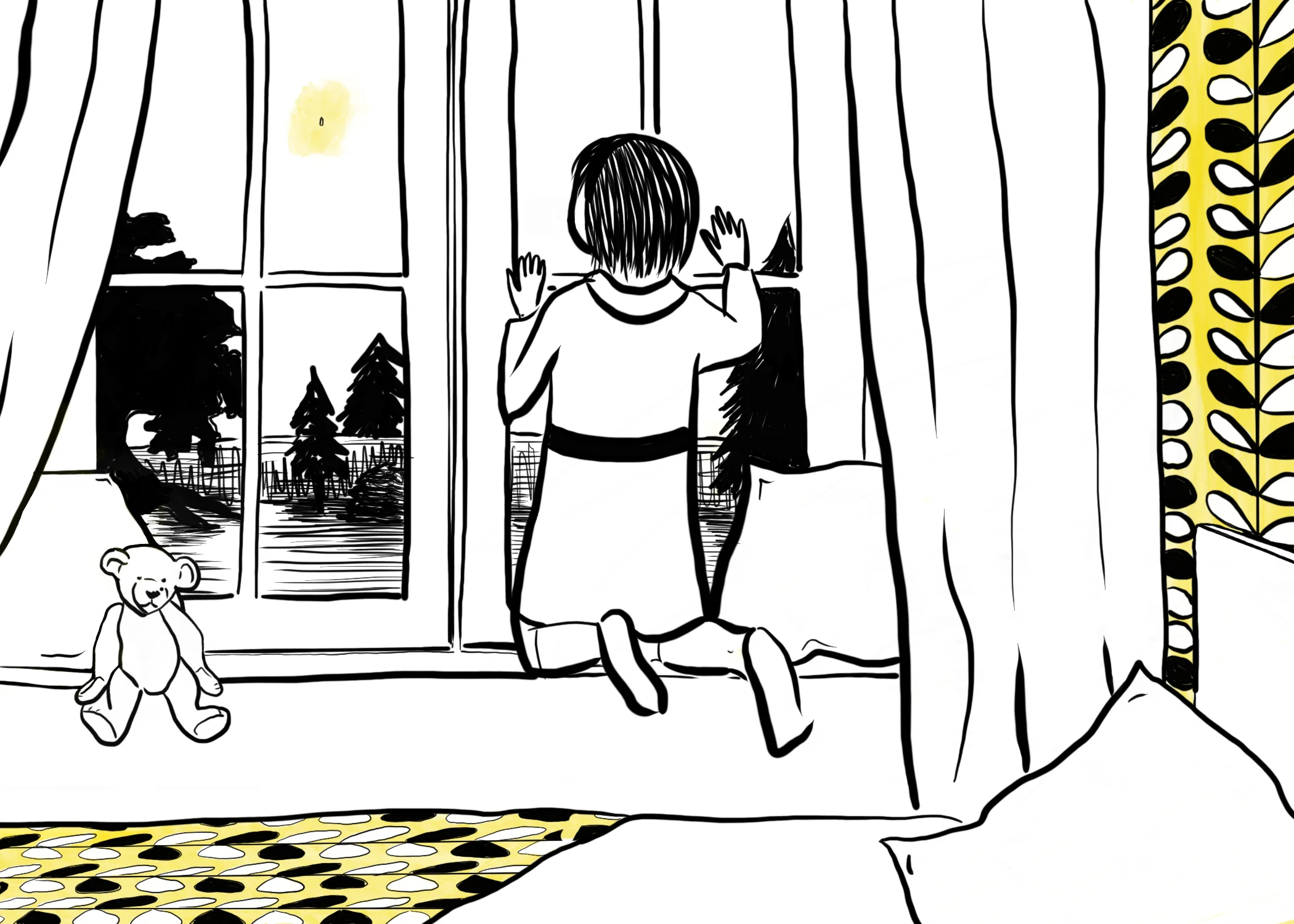You are a recipient of Coucou Postale, a postcard series designed to engage and delight readers through stories and art using good-old fashioned mail and the magic of the Internet.
Reread Part Two if you wish to recall where we last left Contessa or continue to Part Three.
Part Three
Contessa’s gaze turned toward the piles of rocks around her. So lulled by the light, she didn’t notice the roots amongst her feet. Loads of them. Twisty ones, gnarled ones. Ones as thick as her waist, and others the width of her pinky. Then she heard another sound. It was fainter than the beat, but also familiar. Was it a spring? She glanced around the cave. Her eyes, glazed with light, darted from crystal peak to crevice. On a far off rock-wall, she spotted a dark stain that glistened above a trickle of water.
If a spring existed, then perhaps there would also be a way home. Didn't springs always begin and end somewhere? Contessa headed towards the sound of water. She navigated slick, stone slabs, and crystals that soared to great heights above her. The sound of the beat and water merged. Gurgle, gurgle, ba-dum, ba-dum. Contessa quickened her step. Gurgle, gurgle, ba-dum, ba-dum.
At a cluster of the largest and shiniest of the crystals, she stopped. She found the spring. And then she noticed the most wondrous thing. It seemed to flow with the sound of the beat.
Did you know we begin our lives with a beat? There is the music of your mother’s heart, of course, but there is a deeper beat, one silenced by the noise humans make. It is the beat of the Earth. After you were born, you forgot that beat. You had your rattles and firetrucks, the television, stadiums of cheering crowds at your graduation, then sports and music events, shopping malls — a lavish symphony of sound and nowhere a beat. For a long time, I also forgot about the beat — even longer than Contessa. For when she stood at the edge of the stream in this cavern of curiosity, she remembered it. And she remembered the oak tree. Everything, she realized, had a heartbeat. What did it mean?
Hours passed since she first appeared in the cave. She heard a low gurgle again, but this came from deep within her belly. She needed to eat something, but the only way she could do that was to find a way out. The water flowed to her left, so she followed it to the right, carefully walking alongside the giant crystals. Each one she passed, she ran her tiny hand across its glassy surface. She felt a rush through her arm, a warm, electric feeling — like the kind you get when someone plays with your hair. She was cold, but the crystals chased away the chill.
The spring became a stream where the crystals glowed the brightest, and farther along, she spotted something she thought might help: a ladder. This was no ordinary ladder, such as the one Papa used to place the star atop the evergreen on the eve of Christmas. No, this one was made of the same roots she tripped over. It was elaborately woven together with two thick rails, and wide, root rungs. One, two, three, four, five, six, seven, eight, nine, ten... She counted into darkness. Seventeen rungs. If there were more, she would have to climb to find out. The took hold of the rails and stepped on the first rung.
After collecting rocks and drawing, climbing was Contessa’s other favorite pastime. Papa allowed her to climb the oak tree in the back garden under his watchful eye. In the arms of the oak, Contessa imagined herself far away, sailing across the high seas at the helm of a branch. Or flying through the blues skies as high as the red kite, a bird whose feathers she often found on walks with Papa. When Papa would nap, she would take the red kite feather to his toes and tickle him awake. Or imagine it was a wand that could turn a caterpillar into a butterfly.
"Abracadabra!" she waved the feather above a green squiggle. Except the caterpillar remained, supping on its milkweed meal.
The point was, trees allowed her to be and do so much. Even below ground, where they were bare of branches to climb and blooms to woo, they were helping her. This time, perhaps, bringing her home. As she climbed the root ladder, she tightly grasped its rungs and pulled herself up higher and higher. Or was it possible the roots pulled her up? She wasn't sure. She pressed on, deeper into darkness. The glow from below faded as she ascended. The beat grew faint. She dared not to think about how high above the crystals she was now. She lost count at fifty-five, the year she was born. Still, it was enchanting. Beneath her, the crystals flickered like birthday candles.
When she didn’t think she could go any farther, the ladder suddenly stopped. She ran her hands over the top of the rails. It coiled over a ledge and rooted into the ground. Contessa stretched out her hand. Yes! It was the end of the ladder. She pulled herself up, and at last! She could see the faintest daylight at the end of a narrow tunnel. She carefully walked towards the light, dragging her hands along the wall. It was no longer smooth. Instead, it crumbled under her fingers. Plink, clatter, plonk. Pebbles scattered on the ground. She sniffed her nails. Soil.
At last, she came to the end of the tunnel. She paused to breathe. Contessa could no longer hear the beat. She sucked in the potent perfume around her. The scent of life. Dank, sweet, and wet. Earth. She could see the tunnel now. Light shone through a tangle of leaves. This would be her exit. She looked around one last time. The path was narrow and worn. Other people have been here, she thought. Someone can help me get home.
Contessa stepped on a platform beneath the hole and shimmied through to the other side. At once, thick leaves stung her face and arms, then legs. They pulled her hair and snagged her clothes. When she freed herself from the vicious plant, she smoothed her dress and straightened her hair ribbon. Then she turned her attention toward her foe. It was a holly bush, placed here for a reason. For behind it, there was a trunk so wide that neither she nor four friends joining together could embrace it. No, it would take ten children hand-in-hand to hug this ancient tree.
∆






